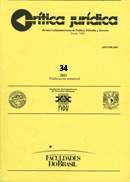Law, Politics and Symbol: Elements for a Critique of Contemporary Public Law
Main Article Content
Abstract
Considering the basic assumption that the modern Law and State theory not only bears similaritiesbut also draws true and genuine epistemological parallels to the constructions of Theology, Hans Kelsen intends to lay bare the ideological meaning that lies at the very core of the traditional dualismwhich constitutes Law and State into autonomous entities. Taking into account Kelsen’s original perceptions—which are seconded by more recent contributions from Claude Lefort and Hans Lindahl’s politicaland symbolic concept and from Carl Schmitt’s notions on political theology— our intention is now to demonstrate the highly conservative role played by the duality of the Law/State structure, whose aim is to remove from under the sway of legal control a considerable part of the State’s actions, which, in turn reflect the ever obscure and arguable raisons d´État. Here below therefore, we will analyze the very legimacy of the so-called. “Public Law”, wich seems to point to a trend towards shunning the legal power regulation. Finally, based on the functional method pioneered by Ernst Cassirer, legal institutions such as “collective will” and “public interest” will be problematised, in order to ascertain whether they contain theological, conservative and authoritarian traits incompatible with the conceptual and substantial unity instrinsic to Rule of Law
Article Details
How to Cite
Costa Matos, A. S. de M. (2013). Law, Politics and Symbol: Elements for a Critique of Contemporary Public Law. Crítica Jurídica. Revista Latinoamericana De Política, Filosofía Y Derecho, (34). https://doi.org/10.22201/ceiich.01883968p.2012.34.35476
